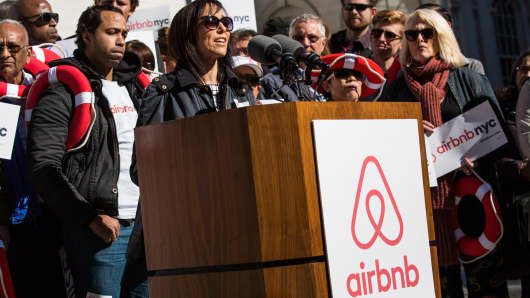New York recently passed a law banning apartment rentals for less than 30 days on Airbnb.
This puts Airbnb on their heels not only because it significantly limits their New York inventory, but because it could create a ripple effect of political challenges for Airbnb across the globe. Therefore, repealing the law or overturning it in court is paramount for Airbnb — but it may not be easy.
Can the law be overturned in Albany?
Airbnb will likely mount a major legislative effort to repeal the New York law and seek to replace it with a system of self-regulation and enforcement. Chris Lehane, who runs politics for Airbnb, is an incredibly smart and talented guy so if anyone can do it, he can. But 2017 is an election year in New York City, 2018 is an election year for state elected officials, and convincing the state legislature and governor to do a 180 over the objections of the powerful hotel trades workers union and the affordable housing advocates will be tough (and while Airbnb will seek to paint the governor and legislature as anti-tech, there are enough other bills and issues important to tech in New York next year to give elected officials the opportunity to ignore Airbnb and still position themselves as pro-innovation).
Airbnb is putting money into elections right now to oppose legislators who voted against them (and send a message to everyone else), but like a lot of Airbnb's efforts to date, it's likely too little, too late.
Can the law be overturned in the courts?
Airbnb unquestionably has great lawyers who will come up with great arguments against the new law. But it's hard to see how the state lacks the right and jurisdiction to protect public health and safety by regulating hotels and it's hard to see how the resulting harm to Airbnb is enough for a judge to take that authority away from the State.
Perhaps they'll find a way (and they'll likely see greater success in court in challenging the San Francisco statute) but like overturning the law in Albany, it'll be tough.
How widespread is the problem?
Unlike Vegas, what happens in New York is witnessed everywhere. Regulators, hotels, hotel unions and affordable housing advocates across the globe are watching closely. The weaker Airbnb seems in New York, the more emboldened their opponents will be to propose and fight for similar restrictions everywhere else. This is not only a significant threat to the business, it also creates internal competition for time, money and focus, potentially making a sustained fight in New York even harder.
Whether or not Airbnb can overcome this is unclear at best. Hosts will likely begin dropping the site and bookings will plummet.
But what is clear is that other start-ups can learn from Airbnb's mistakes – take regulation seriously, don't underestimate the opposition, understand what grassroots abilities you truly have and can truly mobilize, and -- whether as a compromise or as a fight -- approach the risk properly. Every issue, every jurisdiction and every company is different so there's no one size fits all answer or approach.


